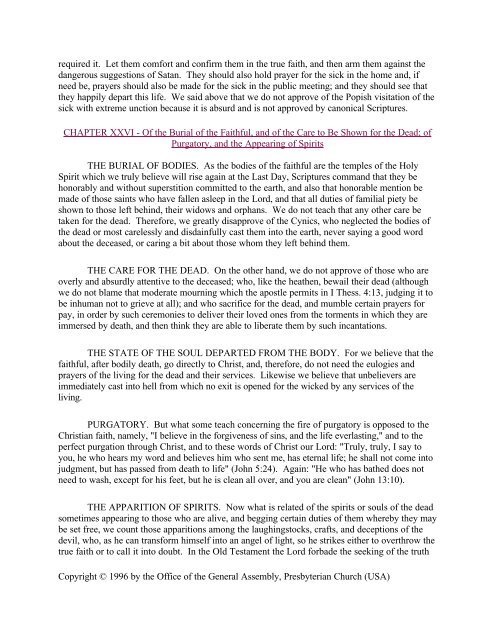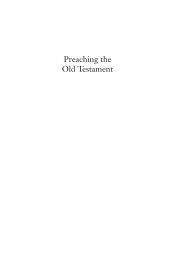The Book of Confessions - The Presbyterian Leader
The Book of Confessions - The Presbyterian Leader
The Book of Confessions - The Presbyterian Leader
Create successful ePaper yourself
Turn your PDF publications into a flip-book with our unique Google optimized e-Paper software.
equired it. Let them comfort and confirm them in the true faith, and then arm them against the<br />
dangerous suggestions <strong>of</strong> Satan. <strong>The</strong>y should also hold prayer for the sick in the home and, if<br />
need be, prayers should also be made for the sick in the public meeting; and they should see that<br />
they happily depart this life. We said above that we do not approve <strong>of</strong> the Popish visitation <strong>of</strong> the<br />
sick with extreme unction because it is absurd and is not approved by canonical Scriptures.<br />
CHAPTER XXVI - Of the Burial <strong>of</strong> the Faithful, and <strong>of</strong> the Care to Be Shown for the Dead; <strong>of</strong><br />
Purgatory, and the Appearing <strong>of</strong> Spirits<br />
THE BURIAL OF BODIES. As the bodies <strong>of</strong> the faithful are the temples <strong>of</strong> the Holy<br />
Spirit which we truly believe will rise again at the Last Day, Scriptures command that they be<br />
honorably and without superstition committed to the earth, and also that honorable mention be<br />
made <strong>of</strong> those saints who have fallen asleep in the Lord, and that all duties <strong>of</strong> familial piety be<br />
shown to those left behind, their widows and orphans. We do not teach that any other care be<br />
taken for the dead. <strong>The</strong>refore, we greatly disapprove <strong>of</strong> the Cynics, who neglected the bodies <strong>of</strong><br />
the dead or most carelessly and disdainfully cast them into the earth, never saying a good word<br />
about the deceased, or caring a bit about those whom they left behind them.<br />
THE CARE FOR THE DEAD. On the other hand, we do not approve <strong>of</strong> those who are<br />
overly and absurdly attentive to the deceased; who, like the heathen, bewail their dead (although<br />
we do not blame that moderate mourning which the apostle permits in I <strong>The</strong>ss. 4:13, judging it to<br />
be inhuman not to grieve at all); and who sacrifice for the dead, and mumble certain prayers for<br />
pay, in order by such ceremonies to deliver their loved ones from the torments in which they are<br />
immersed by death, and then think they are able to liberate them by such incantations.<br />
THE STATE OF THE SOUL DEPARTED FROM THE BODY. For we believe that the<br />
faithful, after bodily death, go directly to Christ, and, therefore, do not need the eulogies and<br />
prayers <strong>of</strong> the living for the dead and their services. Likewise we believe that unbelievers are<br />
immediately cast into hell from which no exit is opened for the wicked by any services <strong>of</strong> the<br />
living.<br />
PURGATORY. But what some teach concerning the fire <strong>of</strong> purgatory is opposed to the<br />
Christian faith, namely, "I believe in the forgiveness <strong>of</strong> sins, and the life everlasting," and to the<br />
perfect purgation through Christ, and to these words <strong>of</strong> Christ our Lord: "Truly, truly, I say to<br />
you, he who hears my word and believes him who sent me, has eternal life; he shall not come into<br />
judgment, but has passed from death to life" (John 5:24). Again: "He who has bathed does not<br />
need to wash, except for his feet, but he is clean all over, and you are clean" (John 13:10).<br />
THE APPARITION OF SPIRITS. Now what is related <strong>of</strong> the spirits or souls <strong>of</strong> the dead<br />
sometimes appearing to those who are alive, and begging certain duties <strong>of</strong> them whereby they may<br />
be set free, we count those apparitions among the laughingstocks, crafts, and deceptions <strong>of</strong> the<br />
devil, who, as he can transform himself into an angel <strong>of</strong> light, so he strikes either to overthrow the<br />
true faith or to call it into doubt. In the Old Testament the Lord forbade the seeking <strong>of</strong> the truth<br />
Copyright © 1996 by the Office <strong>of</strong> the General Assembly, <strong>Presbyterian</strong> Church (USA)




